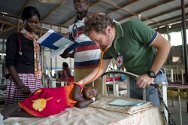South Africa: real threats to health care
25-06-2012 Interview
Back from the 23 April London Symposium on Health Care in Danger, Peter Fuhri, from the South African Department of Health, spoke with the ICRC about the Symposium and health care in danger in the South African context.
How does the issue of threats to health care resonate in the South African context?
As a country, we do suffer. We have had cases of health-care workers being attacked who were not targeted, but who got in the way of conflicts between individuals or groups. Once, an Emergency Medical Services (EMS) colleague was nearly petrol-bombed during gang violence in Cape Town. In another case, a patient was stabbed through the window of an ambulance. And just yesterday, I was in the Northern Cape province where staff highlighted the issue quite forcefully – their EMS staff have had problems when attending to health-care needs in volatile protest situations, especially in rural areas.
Thus, we can't just look at threats to health care in situations of armed conflict; we need to look at other factors and potentially violent settings such as community protests, tensions between opposing political parties, gangsterism, or labour action during a strike.
What are the factors that influence these types of threats to health care in South Africa?
I don't think that it’s the health-care facilities or workers themselves that are being targeted, but they are caught up in the situation. There has been a strong drive in this country to get health care out to everyone. The unfortunate situation is that health care is not always seen as being a protected environment. For instance, when an ambulance goes into an area, it is not always seen as an ambulance, meaning that no one will touch it. Furthermore, the ambulance crew might be picking up somebody that the community, or a particular group, doesn’t want to be treated.
What solutions are there to mitigate such risks?
We are considering a public media campaign to explain what EMS is really about, to ensure that we are seen as being there to assist the communities irrespective of who they are. We have also improved communication between ambulances and radio rooms in just about all of the provinces. As a result of better communications, there have already been improvements in safety. In the rural areas, we are still working to further improve radio communications. Lastly, we are looking closely at counselling staff following traumatic incidences, ensuring that they receive effective employee assistance.
Shifting to the London Health Care in Danger Symposium, what struck you in terms of images and issues from other contexts?
I think what really struck me was, at times, the conscious disregard for the Geneva Conventions. I recall the very short clip of the tank pursuing the opposition and suddenly there's a health-care worker right in its sights. Those kinds of things may just happen inadvertently but there are also cases of doctors being charged for contravening anti-terrorism laws for treating opposition members. That struck me as a major problem because the Geneva Conventions are very clear that doctors must treat all the wounded, and yet, there's great disregard.
What do you believe can be done internationally to deal with these issues?
When we talk about health care in danger, it's always anecdotal. What we're missing here is a proper collection of data so we could actually record the incidences to understand the extent of the problem. Even in a business environment, unless you have proper information, you can't manage the situation. So, I think that has to be a very strong focus.
Ethical issues, patient dignity and the right to the best care possible, are other important areas of focus. If you are in a conflict situation, you cannot just ignore the dignity of a patient. That's something that's of paramount importance – everyone has a right to dignity.
If you are trying to treat a patient and you've got a hospital under attack or you're out in the field trying to pick up a patient, ethics might be the last thing that you're thinking of; all you want to do is survive and help the patient survive. Sometimes you can't treat the patient or the situation the same as you would, for example, a motor vehicle accident outside here on the road, because there's a different sense of urgency, a different set of circumstances. Once your own life is in danger, it's pointless getting yourself killed because then you're of no use to anyone.
Ethics is one of the issues that needs to be explored further in a regional conference because, even in times of disaster, the issues can be very similar. You might not have the violence from armed conflict but you do have the dangers of a post-disaster situation. Although Southern Africa is in a fairly peaceful situation, there are often requests for peacekeepers or international assistance. Therefore, I think it is relevant.
In closing, is there anything else you'd like to share?
While we do not have armed conflict in South Africa, we do have areas of danger for health care so I think that we would benefit from participating in a regional health care in danger conference.
One of the things that we'd like to do is to try and get more information on the type of health-care-in-danger situations that we have. Yet, it is difficult, anywhere in the world, to collect this type of information because you don't want it to be anecdotal; you want to have solid data. Hopefully the regional conference I am proposing will actually steer us as a country toward looking at health care in danger in a different light, not just acknowledging the problem, but actually coming up with a strategy on how we should deal with it.



